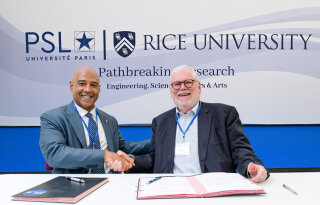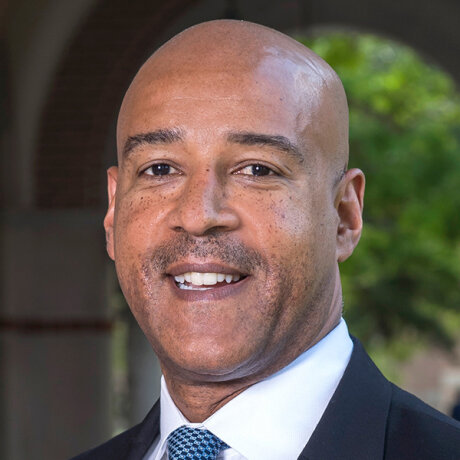ExclusiveR. DesRoches (Rice University) to News Tank: partnership with PSL (France), its priorities worldwide
"Université PSL (Paris Sciences & Lettres, France) and Rice University (U.S.) have great strategic complementary research areas, and we announced that we will collaborate in four of them. The research we do aim to solve challenges that cities like Paris and Houston face", says Reginald DesRoches, President of Rice University to News Tank on 23/05/2024.
In this exchange, he looks back at the signing of the strategic partnership for research and innovation between Rice University and Université PSL, which took place in Paris on 13/05.
He points out that the two universities are also considering an educational partnership, with student exchanges:
"We'd like their students to spend time in Houston on our Rice campus, and we anticipate our students spending time in Paris. This would be for both research and potentially taking classes."
Rice University President says Rice is involved worldwide: "We're launching a new campus in India. This is part of our global strategy, which has three strategic areas: Europe (based in Paris), Asia (based in India), and in the future, Latin America."
In fact, Rice University is already established in Paris with a campus in the Marais since the summer of 2022. "It’s a great place for us to really embark on our new collaboration with PSL, which is a great university in Paris."
"Our strengths complement each other well"
Can you outline the ins and outs of this partnership?
We have signed this strategic partnership for research and innovation on major global challenges and opportunities on the 13/05/2024 in Paris.
PSL and Rice have great strategic complementary research areas, and we announced that we will collaborate in some of them: energy and climate, which is clearly a global challenge. Medicine is another area of collaboration, along with urban issues, given that both universities are located in major cities—Houston and Paris. The research we do aims to solve the challenges that cities like Paris and Houston face. The fourth area is around quantitative computing and AI Artificial intelligence , which will enable advancements across various topics.
We found that our strengths complement each other well in those four areas, and there may be others in the future. Together, we believe we can achieve incredible things in research and discovery. It's an ideal partnership due to their unique strengths and ours.
I'm excited about this collaboration because I'm familiar with the strong technical background of students from Europe, particularly Paris, in mathematics and physics. During my time at Georgia Tech, I had several graduate students from Paris and France, and I found their training to be exceptional.

You had your workshop on 14/05. Have you fixed some project ideas? Do you already have some projects launched?
That's the next step. The workshop brought together around 20 people from each university to present on those four topics and discuss the challenges and strengths we each have.
The next step is to come together again and start joint projects, with researchers from both PSL and Rice, along with students from both institutions, working on those projects for a year or more. We aim to do this across all four topic areas, with possibly multiple projects within each.
Do you see any differences between the French and American approaches of the researchers?
The differences usually stem from their disciplines —whether they are more scientists or engineers— rather than their nationality. Both PSL and Rice bring people across different disciplines to solve problems, which is crucial for addressing big challenges. This interdisciplinary approach is something both universities do well.
"We're exploring opportunities for joint educational programmes"
Do you have other plans to bring together students?
That's also the next step. We'd like their students to spend time in Houston on our Rice campus, and we anticipate our students spending time in Paris. This would be for both research and potentially taking classes. We're exploring opportunities for joint educational programmes between the two institutions.
Regarding the economic model, there are differences between the U.S. and France, such as tuition fees versus state subsidies. Does this create any limits for the collaboration?
Not for the research collaboration. Tuition fees aren't an issue for that because it's about bringing researchers together to solve big problems and the way it's conducted at PSL and Rice is very similar, so there are no issues there.
It's a combination of both universities putting forward internal resources for the collaboration, and we will also pursue funding opportunities from government entities, including the French government, that support international collaboration.
If we start programmes for students to study at each other's institutions, we'll need to address the differences in tuition »If we start programmes for students to study at each other's institutions, we'll need to address the differences in tuition, but we're working on that.
"We're hoping our Paris campus will be a hub for broader European relationships"
What are your priorities in terms of global collaboration?
We have several. We're launching a new campus in India. This is part of our global strategy, which has three strategic areas: Europe (based in Paris), Asia (based in India), and in the future, Latin America.
In Europe, one major partnership is with the University of Edinburgh in Scotland, which began about two years ago. We have joint research programmes with their researchers around different topics.
We're hoping our Paris campus will be a hub for broader European relationships. Right now, it's mainly PSL and Edinburgh, but we're exploring other opportunities with universities that have similar cultures and approaches to research. We prefer having fewer but stronger strategic partnerships.
In Europe, we're seeing a lot of pro-Palestinian student uprisings in universities, something we've already been seeing in the United States for some time. Has this reached your university as well? What's your position on these student initiatives?
We've had protests on campus, and we support the students' right to protest. We believe in their right to freedom of speech and expression as long as it doesn’t disrupt university operations. That has been the case at Rice.

